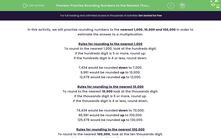In this activity, we will practise rounding numbers to the nearest 1,000, 10,000 and 100,000 in order to estimate the answer to a multiplication.
Rules for rounding to the nearest 1,000
To round to the nearest 1,000, look at the hundreds digit.
If the hundreds digit is 5 or more, round up.
If the hundreds digit is 4 or less, round down.
7,434 would be rounded down to 7,000.
9,981 would be rounded up to 10,000.
12,678 would be rounded up to 13,000.
Rules for rounding to the nearest 10,000
To round to the nearest 10,000 look at the thousands digit.
If the thousands digit is 5 or more, round up.
If the thousands digit is 4 or less, round down.
74,434 would be rounded down to 70,000.
96,981 would be rounded up to 100,000.
125,678 would be rounded up to 130,000.
Rules for rounding to the nearest 100,000
To round to the nearest 100,000, look at the ten thousands digit.
If the ten thousands digit is 5 or more, round up.
If the ten thousands digit is 4 or less, round down.
742,434 would be rounded down to 700,000.
968,981 would be rounded up to 1,000,000.
185,678 would be rounded up to 200,000.
Example:
2,624 x 1,122 = ?
Round each number to the nearest 1,000 first
2,624  3,000
3,000
1,122  1,000
1,000
Now calculate: 3,000 x 1,000 = ?
3 x 1 x 1,000 x 1,000 =
3 x 1,000,000 = 3,000,000 (3 million)
Top tip for multiplying large numbers with lots of zeros!
Remove the zeros, do the calculation and then put the zeros back!
3,000 x 1,000: remove the six zeros and do 3 x 1 = 3
Add the zeros back: 3,000,000
Are you happy with all this?

Let's get started.







